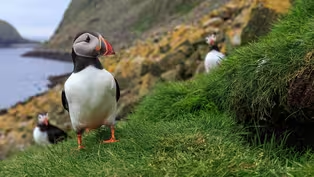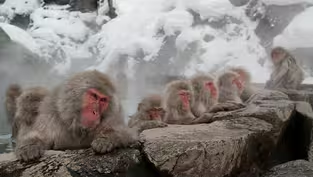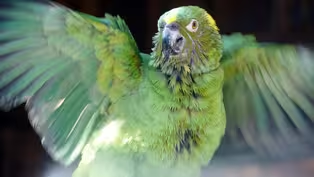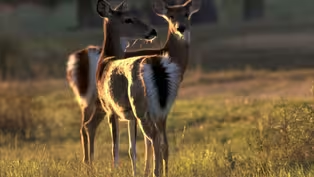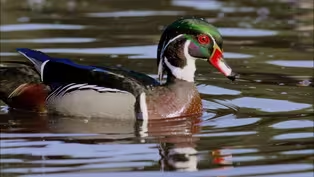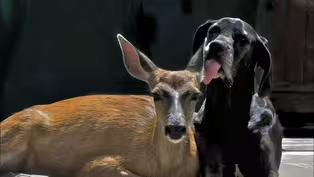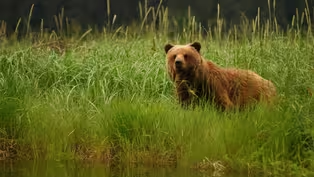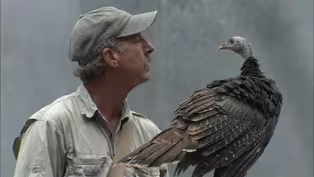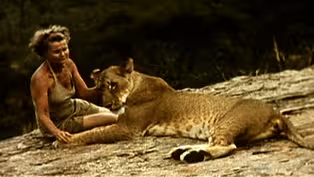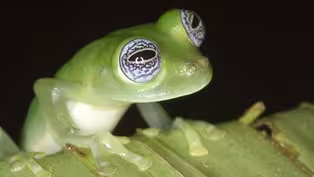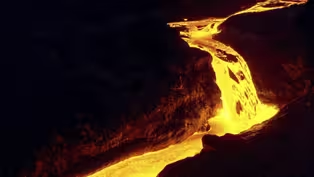
Land of Dragons
Season 9 Episode 7 | 55m 11sVideo has Closed Captions
Hong Kong: English Crown Colony history
A natural history of Hong Kong explores wildlife of the British colony's mainland, seas and islands.
Problems playing video? | Closed Captioning Feedback
Problems playing video? | Closed Captioning Feedback
Major support for NATURE is provided by The Arnhold Family in memory of Henry and Clarisse Arnhold, Sue and Edgar Wachenheim III, The Fairweather Foundation, Charles Rosenblum, Kathy Chiao and...

Land of Dragons
Season 9 Episode 7 | 55m 11sVideo has Closed Captions
A natural history of Hong Kong explores wildlife of the British colony's mainland, seas and islands.
Problems playing video? | Closed Captioning Feedback
How to Watch Nature
Nature is available to stream on pbs.org and the free PBS App, available on iPhone, Apple TV, Android TV, Android smartphones, Amazon Fire TV, Amazon Fire Tablet, Roku, Samsung Smart TV, and Vizio.
Buy Now
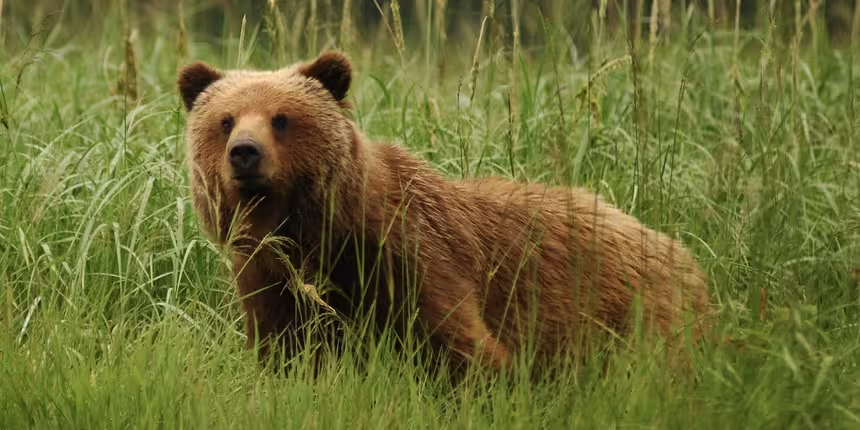
Explore More Ways to Watch
Bring the beauty and wonders of wildlife and natural history into your home with classic NATURE episodes.Providing Support for PBS.org
Learn Moreabout PBS online sponsorshipMore from This Collection
Watch classic NATURE episodes with the PBS station member benefit Passport.
Video has Closed Captions
Animals congregate in huge colonies partly out of necessity and partly for the security. (52m 55s)
Video has Closed Captions
Follow a troop of snow monkeys in Japan to see how they prepare to face the world. (52m 58s)
Video has Closed Captions
Parrots and the bittersweet world they share with humans. (53m 10s)
Video has Closed Captions
Learning about one of our closest neighbors: the white-tailed deer. (53m 10s)
Video has Closed Captions
Take a fascinating look at one of our most familiar birds. (1h 42s)
Video has Closed Captions
Love apparently knows no boundaries in the animal kingdom. (53m 20s)
Video has Closed Captions
Enter a world shaped by bears, trees, and salmon. (50m 9s)
Video has Closed Captions
One man's remarkable experience of raising a group of wild turkey hatchlings to adulthood. (58m 51s)
Elsa's Legacy: The Born Free Story
Video has Closed Captions
The true story that inspired "Born Free". (53m 10s)
Video has Closed Captions
It is the greatest mass extinction since the dinosaurs. (53m 43s)
Video has Closed Captions
Kilauea, on Hawaii's Big Island, is the world's most active volcano. (54m 6s)
Video has Closed Captions
Relationships with cats and dogs are some of the longest and most intimate of our lives. (53m 30s)
Providing Support for PBS.org
Learn Moreabout PBS online sponsorship[whistles blowing and drums thumping] [birds chirping] [light music] [light music] - When wildlife and human populations compete for the same space, there's rarely any doubt about the outcome, and that's certainly the case in Hong Kong, one of the most crowded places on earth.
It's on the southern coast of China and is more than just a city.
It's a British crown colony, which includes part of mainland China and more than 200 islands the peaks of a now submerged mountain chain.
In 1997, the British lease on the colony runs out and once again, Hong Kong will become part of China.
It will be, of course, a major turning point for the millions of people who make their living in this world economic center.
But among the skyscrapers, the crush of humanity and the now polluted waters wildlife hangs on with the tenacity of its own.
Black kites still soar over the city and commerce fish in the orient's greatest harbor.
[light East Asian music] [light East Asian music continues] - Hong Kong is an international center for business and finance.
It's a city known to millions.
Yet behind its familiar face lies another unexpected world of extraordinary creatures as strange and colorful as the orient itself.
[light East Asian music continues] [water burbling] [whistle blowing and drum thumping] Dragons were always important in Chinese mythology and some of the most spectacular dragon festivals and the world are staged in Hong Kong.
Crocodiles once lurked in these waters, they were the models for the dragon boats.
The Dragon Boat Festival celebrates the death of Qu Yuan a national hero who drowned himself 2000 years ago and protest against a corrupt government.
Rice dumplings are cast symbolically into the sea to stop marine creatures from devouring his body.
Even without the mythical dragons the rice will not be wasted.
There is still life in Hong Kong's waters.
But many animals are seriously threatened.
Loss of habitat and relentless persecution are decimating the turtle population.
Today they are rarely seen outside of the zoo.
[people chattering] Hong Kong is one of the most densely populated places in the world.
Most of its 6 million people live in Kowloon and Victoria.
The original cities built around the harbor.
In some areas people live eight to a room to ease the crush.
New buildings loom on every horizon.
This is the Hong Kong we all recognize but few people realize that the territory also includes more than 230 islands and some 400 square miles of mainland China.
This overcrowded urban area is the last place you would expect to see wildlife but Hong Kong is full of surprises.
Squirrels, though originally from Thailand, are just some of the many creatures found in the teeming city.
Hong Kong on the edge of the tropics was once covered in rainforest.
Today, a great range of species from both temperate and tropical lands coexist in the city.
[birds chirping] African gray parrots do not occur in the wild here but they are one of hundreds of foreign species for sale and the street market.
[people chattering] [birds chirping] Birds hold a special place in Chinese culture.
They're treasured as pets for their song and beauty.
They may be well fed and safe from predators but their cages are tiny and they're rarely given the chance to breed.
It's now illegal to catch wild birds in Hong Kong but they're still imported from China in enormous numbers, and the trade is seriously depleting the native populations there.
It's ironic that this reverence for birds is leading to their serious decline.
The day may come when only paper birds fly over Hong Kong.
[light music] In Hong Kong, black kites are protected but in China they are a delicacy believed to have special medicinal properties giving people strength and courage.
But here for now at least, they soar between the buildings with as much ease as their ancestors once flew among cliffs and canyons.
[light music continues] At the heart of Hong Kong lives Victoria Harbor.
It's the busiest port in the world.
A quarter of a million ships passed through every year.
Hong Kong means fragrant harbor.
Years ago, a waterfall tumbled into this.
Once beautiful bay and flowers grew in profusion along its shores.
Today its polluted waters are far from fragrant.
But scraps and dead fish provide scavenging kites with an easy meal.
In early spring high, above the super tankers they performed their spectacular courtship displays.
[light music continues] Gulls too are attracted in large numbers and compete with the kites for harbor refuse.
Cormorants come here to fish.
Every winter several hundred fly down from their breeding grounds in China.
Trawling in the harbor is restricted.
Fishing nets are a hazard to both shipping and wildlife but with so much traffic it's difficult to enforce the laws.
In China, fishermen still train captive cormorants to catch fish, but in Hong Kong, old traditions have died as the city rushes into the 21st century.
The harbor is polluted.
But surprisingly, large numbers of fish live in its murky waters.
It's a treacherous hunting ground, but the rewards are high.
[birds chirping] Flotsam washed up on the harbor beaches is an eyesore but the real threat is more insidious.
Besides domestic and industrial rubbish, discharged oil and waste chemicals, millions of gallons of raw sewage are flushed into the sea every day.
The city's outpourings would choke the harbor's wildlife to death if the tide didn't take most of it out to sea.
Young fish are the first to suffer and the latest research shows that stocks are dwindling.
Several species of fish eating birds like these reef egrets, live in the harbor and their existence too is threatened.
Some are already desperate.
A king fisher tries in vain to rid its feathers of oil.
The cormorants commute daily to the harbor.
At dusk, the birds fly west where they can roost in peace away from the bustling city.
[light music] [light music continues] [fireworks exploding] When Hong Kong celebrates, nobody sleeps.
[fireworks exploding] Bright lights and high finance attract visitors from all over the world.
About one and a half million each year.
After dark, the streets are ablaze of neon, but away from the lights.
It's not just people who are out for a night on the town.
The tokay is the largest gecko in the world.
A full grown adult is 10 inches long and has a voracious appetite.
[light dramatic music] Oblivious to the dramas being played out in the shadows, the people of Hong Kong flood onto the streets for a night's entertainment.
The Happy Valley race course lies in the heart of the city.
The site was originally a swamp a mythical haunt of dragons.
For centuries, malaria carrying mosquitoes and crocodiles kept people at bay.
But in the mid 1940s, the swamp was drained.
Its reeds replaced by floodlit turf.
The races are run at night to avoid the intense daytime heat and humidity.
Thousands of people flood through the gates and millions of dollars exchange hands at every event.
A great deal of this wealth has been lavished on preserving historic buildings and works of art but all too little on conserving what's left of Hong Kong's natural heritage.
Now times are changing and the Royal Hong Kong Jockey Club is one of a growing number of local organizations taking a greener view of the environment.
Even this unlikely location has its wild residence.
In a city lacking tall trees the racetrack floodlights make an acceptable substitute.
Magpies build large, thick nests and a limited space on this man-made structure is hotly contested.
[birds chirping] Black kites also thrive in human environments.
Because of this, they're among the most successful birds of prey.
Their breeding season has begun.
A hectic harbor seems an inappropriate place to raise young but in the middle of the shipping lanes there's an unexpected sanctuary.
[light East Asian music] Stonecutters Island strategically located in the center of the harbor.
It's been used for over a century by the British for defense.
It is still used exclusively by the military and access is strictly limited.
Relatively undisturbed, it provides some refuge for wildlife.
[light music] Natural nesting materials are limited in the city but there's no shortage of plastic and paper.
[birds chirping] Only the female kite incubates the eggs.
She now faces six weeks of sitting and waiting.
Considering its location stonecutters Island is remarkably tranquil but life here isn't always peaceful.
[soldiers counting loudly] The army uses the island as a training ground but soon there will be a changing of the guard.
In 1997, British rule ends and Hong Kong will once again belong to China.
The old defenses are relics of the past heavily fortified during both world wars.
The bunkers and gun sites are now derelict but not deserted.
The island is famous for its snakes which search for prey among the abandoned ruins.
[birds chirping] Violet whistling thrust chicks keep silent to conceal their whereabouts from predators such as snakes.
They rely instead on their bright yellow mouths to attract the attention of their parents.
Today's Stonecutters Island is one of Hong Kong's few remaining sanctuaries for nature but there are plans for a sewage plan and a recreation complex.
Hong Kong's wildlife faces a constant battle competing with people for every inch of space.
[plane's engine roaring] The international airport is near the city center.
It's the only wide open space left near the harbor and it attracts some unusual visitors.
[plane's engine roaring] Kentish and Oriental plovers fly in alongside hundreds of executives from multinational companies who come to Hong Kong to do business each week.
These birds are in transit migrants who use the runway as a convenient resting place.
[plane's engine roaring] [light East Asian music] Every year, hundreds of thousands of migratory birds break their journey here.
Hong Kong lies on the main flyway between Siberia and Australasia and the birds use the territory as a stopover between northern breeding grounds and winter quarters farther south.
But a host of other wild creatures spend their entire lives here permanent residents and the land of dragons.
[light East Asian music continues] Once a year Hong Kong's dragons run wild through the streets.
[people chattering] These spectacular performances are designed to please Tin Hau, the Goddess of the Sea.
The fisherman hopes she will reward them with good catches in the coming season.
[people chattering and laughing] The fishermen need to put on a good show because the seas around Hong Kong are slowly being poisoned.
[upbeat drums music] Hong Kong's coastline stretches for 500 miles.
For years, it's beaches teemed with life.
Now most are deserted and all of them threatened.
Tin Kak is one of the few remaining healthy shores.
Mudskippers are fish which can breathe and walk out of water.
They're still sufficiently common to compete for space with resident crabs.
The strange acrobatics of these dragon like creatures serve as territorial and courtship displays.
[water splashing and burbling] [upbeat East Asian music] Several species of crab inhabit the beach, each with its own technique of intimidating rivals and attracting a mate.
[upbeat East Asian music continues] [crabs claws clicking] [upbeat East Asian music continues] When the tide has gone out, thousands of soldier crabs emerged from the sand until the whole seashore appears to be crawling.
They march up and down the beach in great armies sifting the sand for something to eat.
When the tide turns the crabs retreat.
As predators move in it's time to disappear below ground again.
They corkscrew out of sight in seconds.
This crab is a little late and its problem has not gone unnoticed.
The sand octopus lives inside an empty clamshell.
It's one of the smallest of its kind but to a soldier crab, it's still a deadly enemy.
[light dramatic music] Eight tentacles equipped with rows of suction pads ensure there's no escape.
[light dramatic music continues] When the tides are high and the moon is full, horseshoe crabs head for a remote sandy beach on Hong Kong's western shore.
In 18 inches of water the female lays and berries her eggs in the sand.
At the same time the male clasp to her back fertilizes them.
Horseshoe crabs are not crabs, in fact but prehistoric members of the spider family.
This pair could be among the last breed in Hong Kong.
A new road runs along the west coast opening up the area.
Before long hordes of day trippers will descend on these deserted beaches.
They will almost certainly drive the crabs away and any which do return, will stand little chance of survival.
The Chinese eat the crabs and their eggs as an aphrodisiac.
20 years ago, the population of Hong Kong rarely spent a day on the beach, but the rising standards of living have given people more money and leisure.
In mid-summer, they now flock to the seaside.
Sand and sea quickly becomes strewn with litter which most people seem to ignore.
[kids chattering and laughing] [water burbling] Several beaches are now so polluted that they've been closed to the public.
The future for Hong Kong's coastline looks bleak but in the hills beyond unspoiled countryside still exists.
[light East Asian music] Hong Kong sits just below the tropic of cancer.
In summer, the temperature can soar to over 104 degrees.
Yet the land is surprisingly lush.
This is because the hot summer months coincide with the typhoon season.
Clouds blow in from the Pacific laden with moisture.
When the warm damp air is forced up over the rolling hills the vapor condenses and a tropical storm breaks.
[light East Asian music continues] [water burbling] Within an hour, streams become tumbling torrents and numerous waterfalls find a new lease on life.
The deluge is rarely last long and the floods subside as quickly as they arise.
But surviving in such unpredictable conditions calls for special adaptations.
The Hong Kong cascade frog has suction pads on the end of each toe so it can cling onto slippery rocks.
The green cascade frog is another species found only in these mountain streams.
[water burbling] In the pools below the falls, the water is turbulent but clear and well oxygenated.
The zebra loach is one of the few fish which has adapted to these conditions.
In fact, it is so specialized that it cannot survive anywhere else.
Its lower fins are enlarged and flattened to form suckers on the underside of its body, securely attached it creeps over the boulders grazing on algae.
[light music] Long armed shrimp wedge themselves in cracks and crevices in the rushing waters.
Their elongated four legs are used to pry debris from beneath the rocks and during territorial squabbles their pincers become effective weapons.
[pincers clinging] [water burbling] The idea of mountain crabs and monkeys living just beyond the city limits seems almost as unlikely as the idea of finding live dragons.
Macaques were probably native here but were wiped out many years ago by the Chinese.
The present populations are descendants of animals which were later released into the wild.
[monkeys screaming] Like most monkeys macaques are inquisitive and intelligent creatures.
They quickly become street wise, and it's not long before they lose their fear of human beings.
[cars engines roaring] The local people enjoy feeding them, even though adult males have a reputation for biting.
In recent years they've become a nuisance in some picnic spots.
They readily accept free handouts and soon discover the best sources of food.
They rarely bother with more natural food these days.
But for the mountain crabs, it's business as usual.
They search the forest floor for grasshoppers.
This silk spider is also a forest predator.
Its large fangs deliver a painful and paralyzing bite.
[dramatic music] This grasshopper avoided one predator only to leap straight into the arms of another.
When her victim is secured, the spider bites to kill.
Stunned by her deadly venom, the grasshopper is helpless.
[dramatic music continues] 40 feet below ground life follows a different rhythm.
[water dripping] The hills are riddled with abandoned iron and graphite mines, many within two miles of the city center.
These bent-wing bats were only recently discovered in Hong Kong.
The temperature in the old mine shaft stays at around 50 degrees.
The bats huddled together to conserve heat and energy.
The Chinese regard bats as symbols of good luck.
So this is one of the few places in the world where they are not persecuted.
Once these hills were covered by thick forests, but centuries of cutting and burning have reduced them to grasslands.
Wild boar have coped with the changing conditions but the hot summer air brings up with it danger.
The grasses are tender dry and hill fires are a constant threat to ground dwelling animals.
A new road forms an effective fire break.
The boar instinctively senses that it's safer on the other side.
These drongos appear to be playing with fire, but in fact, they're catching small reptiles and insects fleeing the flames.
Thousands of trees are destroyed each year and hill fires often blaze out of control threatening property as well as wildlife.
[fire crackling] [fire crackling] [people chattering] Fires are especially bad in April because it coincides with the grave sweeping ceremony.
The symbolic burning of lucky money, candles and joss sticks can all provide the fatal spark.
[people chattering] Ceremonies held in the city seldom get out of hand but families traditionally travel to the hills to celebrate and that's when the countryside can turn to ashes.
[dramatic music] Smoke can suffocate an animal like the ferret badger in its burrow, but this one was lucky.
[dramatic music continues] All around the landscape is changing.
High rises dominate today's horizon, leaving less and less room for wildlife.
[dynamites exploding] Not even the mountains are exempt.
A few sticks of dynamite are all that's required to reduce a hillside to rubble.
Space is at a premium, and once deserted bays and inlets are being reclaimed for development.
But like the traditional villages, most of the modern buildings have inadequate sewage systems.
[sewage burbling] The government has made pollution control a top priority but it faces an enormous challenge.
Sooner or later, the domestic, agricultural and industrial wastes will end up in the sea creating Hong Kong's most pressing environmental problem, marine pollution.
The effect on the marine environment is devastating.
Oyster beds are increasingly contaminated by sewage and industrial waste.
The traditional livelihood of these clam gatherers is also threatened as the risks from food poisoning grow.
With each high tide, polluted water now flushes through the mangroves and marshes, threatening all the animals which live there.
The Mai Po Marshes lie in the far northwest corner of Hong Kong, bordering China.
They are the last marshes left in Hong Kong and the only protected wetlands in Southern China.
They are a vital staging ground for hundreds of thousands of birds migrating between Siberia and Australasia.
[birds chirping] [light East Asian music] Proposals to dump toxic chemicals close to the marsh further threaten the birds.
But plans are underway to save Hong Kong's last wild places.
40% of Hong Kong has been designated parkland where plants and animals are protected, but the rising tide of urbanization and pollution may prove to be insurmountable.
In fewer than 10 years, this border fence will be torn down and with this moment has changed, China will inherit both the wealth and the problems of Hong Kong.
It's uncertain what this transition will bring but what is certain is that a new era will begin for the land of dragons.
[light East Asian music] [light East Asian music continues] [light East Asian music] [birds screaming] [light East Asian music continues] [light music]

- Science and Nature

Explore scientific discoveries on television's most acclaimed science documentary series.













Support for PBS provided by:
Major support for NATURE is provided by The Arnhold Family in memory of Henry and Clarisse Arnhold, Sue and Edgar Wachenheim III, The Fairweather Foundation, Charles Rosenblum, Kathy Chiao and...
